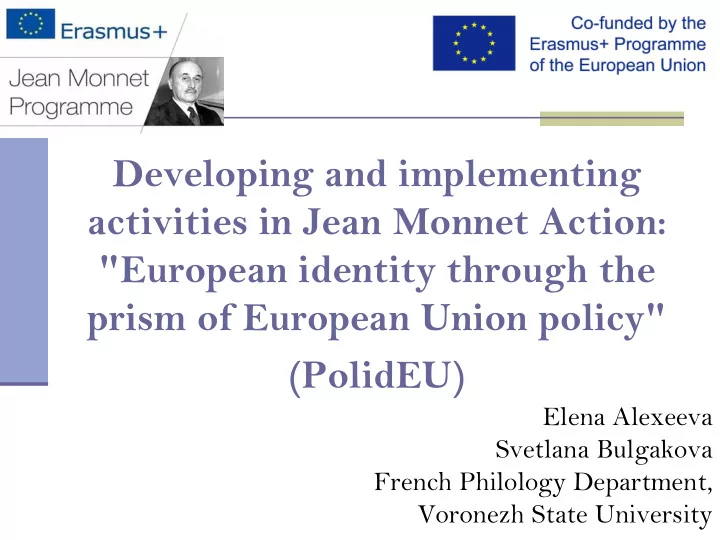

Developing and implementing activities in Jean Monnet Action: "European identity through the prism of European Union policy" (PolidEU) Elena Alexeeva Svetlana Bulgakova French Philology Department, Voronezh State University
PolidEU Jean Monnet project Title: European identity through the prism of the European Union policy (language, immigration and business policy) Duration: 2015-2018 Work group: Elena Alexeeva, Head of the French Philology Department Alla Akulshina , Director of the Centre for International Programmes and Projects Svetlana Bulgakova , Senior Lecturer of the French Philology Department
Project Aim and Objectives Project Aim: foster students’ professional competence by introducing the European dimension into language studies which are non EU related. Project Strategic Objectives increased interest in understanding the European Union, leading to a more active citizenship and enhanced employability; promoting new high quality teaching and research practices in European studies.
Project Objectives improving the level of key students’ professional and civic competences and skills, giving them knowledge in European studies which is relevant for the labor market; increasing awareness of identity related issues and of language as an element of identity; enhancing tolerance and respect towards other cultures as well as the ability to work in multicultural context.
TEACHING AND DELIVERABLES
Module Structure organized in the form of blended learning and project-based learning; modules for students (Language Studies and International Relations), secondary school teachers and participants of Presidential Programme for Training Managers; the volume of face-to-face work is 86 h per academic year.
Jean Monnet Module for Language Students Module 1. Processing and presenting research data and principles of the project-based learning. Module 2. History of the European Union. Module 3. European Union Institutions. Module 4. National and European Identity. Module 5. Values of multiculturalism and language policy of the EU and member states. Module 6. Globalization. Official, regional and minority languages in Europe. Module 7. Translation and interpretation issues in the EU institutions. Module 8. Modern challenges related to language and identity. Multidisciplinary contents: history, political science, law studies, linguistics, intercultural communication studies, language teaching studies, translation studies.
Jean Monnet Module for Language Students 2015-2016 – 36 students (16 projects defended), 2016-2017 – 34 students (14 projects defended), 2017-2018 - 42 students (18 projects were defended) Module 6. Sample subjects for the project work 1. Teaching foreign langages in EU: principles and recommendations in official documents 2. Mobility programmes as a tool for imlemeting EU language policy and fostering European identity 3. French policy of linguistic dirigism and EU law 4. European and Russian language policy: comparative analysis
Deliverables: Course Book and Moodle Course
Jean Monnet Module for International Relations Students Module 9. Identity via the issues on assimilation of immigrants and maintaining the values of multiculturalism. 11 hours of face-to-face learning in 3 groups of students Sample topics for the project work European migrant crisis: a chronology of events EU response to the migrant crisis Attitudes to immigration in EU countries Identity challenges of European migrant crisis
Jean Monnet Module for executive managers Module 10. Taking into account identity-related issues in business communication” 11 academic hours of face-to-face classes for the students of the Presidential program for training managers and MBA Executive. implemented with the participation of invited experts: 2015-2016 - Director of LLC "The power of logistics" Valery Marenich, Director of the company "Tatyanin day" Tatiana Luganskaya, 2016-2017 - Teachers of the ESCP Europe ( École supérieure de commerce de Paris) Raymon Shivre and Vyarcheslav Aviutsky)
Jean Monnet Module for secondary school teachers Module 11 “Taking into account students’ identity during foreign language lessons and the problem of fostering intercultural competence" implemented in the format of scientific and practical seminar (16 academic hours). implemented with the participation of invited experts 2016 – Laurent Senoz, the assistant professor at University of Caen-Normandy (Caen, France)). 2017 – Natalie Fabry, Director of the Ile-de-France Institute for Improvement of Services from the Paris-Est-Marne-la-Vallee University
EVENTS
Annual student scientific conference "European identity through the prism of the policy of the European Union" 2016 – 7 students (3-4 year of studies) from the Faculty of Romance and Germanic Philology and the Faculty of International Relations 2017 – 11 students (2-4 year of studies) of the Faculty of Romance and Germanic Philology. in 2018 – 17 students including MA students 3 collections of papers published.
Simulation "Session of the European Parliament on European Identity"
Identity-related Challenges in Business Relations between Russia and the EU a tour of the enterprise with consecutive interpreting; discussion of changes in Russian enterprises after entering the European group of companies in terms of identity. 2017 – 24 students; 2018 - 9 students.
Contest in Language Teaching Skills September 25-28, 2017 (6 students) May-June 2018, Distance mode (8 students)
DISSEMINATION : Printing and Publishing Course book. Collections of papers of Students’ Conferences. Certificates of participants for all the Events. Booklets for the dissemination of the project’s results. Research papers published in the collection of papers in different Russian universities.
DISSEMINATION: Information on the Internet http://www.vsu.ru/ru/news/fe ed/ - official site of the Voronezh State University http://france-center-vrn.ru/ - official site of the Centre for French and Russian Cooperation http://euspace.vsu.ru/en/eraz mus/zhan_monne/polideu - official web page of the PolidEU project
CONCLUSIONS multidisciplinary approach in training language students allows to achieve a number of learning outcomes stipulated in the Federal Educational Standard; flexibility and adaptability of Jean Monnet module structure gives the opportunity to carry out different activities contributing to the improvement of communication, research, language teaching and ICT competencies; Jean Monnet project has become a powerful factor in the development of inter-faculty, inter-university and school-university cooperation.
Thank you for your attention!
Recommend
More recommend